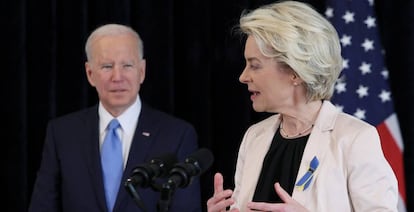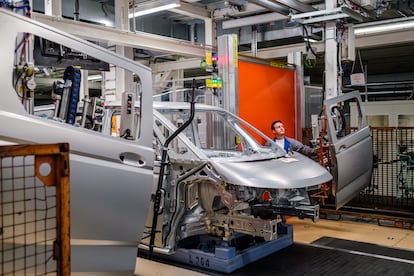Europe says that new US incentives discriminate against its electric vehicles
The EC wants the United States to eliminate measures that allegedly favor sales of domestically manufactured cars


Some aspects of President Joe Biden’s Inflation Reduction Act are threatening to become a new battleground for US-European trade. The proposed bill has already been approved by the Senate, and is awaiting a vote by the House of Representatives. A European Commission (EC) spokesperson in Brussels (Belgium) told EL PAÍS that certain language in the bill “is clearly discriminatory” against electric vehicles manufactured in the European Union (EU). This has led EC President Ursula von der Leyen to formally request that the US remove these “discriminatory elements” from the bill “to ensure that it complies with World Trade Organization (WTO) rules.”
No one expected that Biden would be able to quickly resolve all the trade disputes between the EC and the US that arose during previous administrations. Except for a few anomalies under former president George W. Bush, it was easier to find more protectionist Democrats than Republicans in US political history until Trump arrived in the White House. However, the US-EU relationship has greatly improved under President Biden, and several trade disputes are being addressed. For example, in June 2021, the US and the EU agreed to a five-year truce in a 17-year dispute over subsidies for Boeing and Airbus, and also agreed to remove $10.3 billion in tariffs on goods. Four months later, talks began to end the disputes over aluminum and steel tariffs. This latest issue over electric vehicles has cropped up at a time when the two economic giants are much more focused on obliging China to open up and allow fair competition.
The EC first spotted the problematic language in early versions of the bill, leading EC Executive Vice President Valdis Dombrovskis to communicate his concerns last fall to Katherine Thai, the US Ambassador to the EU. Dombrovskis also sent letters to US Congressional leaders from both parties, and one letter was even cosigned by officials from Canada, Mexico and South Korea. EU sources claim that “measures such as these go against recent efforts to rebuild our relationship so we can resolve past problems and avoid adding new points of tension.”
Tacked on to the Inflation Reduction Act are certain measures to stimulate electric vehicle manufacturing in the United States. Europe seems okay with this, since some EU spokespersons have said, “The EU agrees that tax credits can serve as an important incentive to boost demand for electric vehicles. This is crucial to promoting sustainable mobility and reducing greenhouse gas emissions.” Under Von de Leyen’s leadership, the EC has made addressing climate change its top priority. But, as always, the devil is in the details.

Violation of WTO rules
The EC is concerned that some requirements for qualifying for the incentives punish electric vehicles and components manufactured in the EU. One such requirement is that the minerals used to manufacture vehicles and their components must be of US origin, recycled in the US, or come from countries with which the US has a free trade agreement. The other requirement that the EC considers “discriminatory” is that the tax credit (up to 100% by 2028) would only apply to batteries and vehicles assembled in the US.
“[The incentives] favor certain countries rich in mineral resources, as well as battery production and car assembly in North America, to the detriment of EU products exported to the United States,” said EC leaders, claiming that they violate WTO rules.
Vehicle manufacturing has a myriad of problems around the world. The pandemic led to supply chain breakdowns and component shortages, especially semiconductors. As the pandemic eased, demand increased sharply, further aggravating the supply chain problems and shortages. Then, Russia invaded Ukraine and tensions between China and Taiwan flared up in one of the world’s busiest shipping regions. Meanwhile, the industry is navigating a complex, structural transition from making vehicles powered by fossil fuels to hybrid and fully electric vehicles.
The transition to electric vehicle manufacturing is at the core of the looming US-EU trade conflict because electric vehicles are the industry’s future, and Biden’s plan aims to stimulate sales of domestically manufactured cars and components. At stake are significant European economic interests. In 2021, the United States became the largest market for European vehicle exports, and the 27 EU countries maintain a favorable trade balance in this sector, with respect to the United States and the world. These conflicting interests in an industry that provides stable, well-paid jobs are why a protracted trade dispute between the two economic powers seems to be unavoidable.
Tu suscripción se está usando en otro dispositivo
¿Quieres añadir otro usuario a tu suscripción?
Si continúas leyendo en este dispositivo, no se podrá leer en el otro.
FlechaTu suscripción se está usando en otro dispositivo y solo puedes acceder a EL PAÍS desde un dispositivo a la vez.
Si quieres compartir tu cuenta, cambia tu suscripción a la modalidad Premium, así podrás añadir otro usuario. Cada uno accederá con su propia cuenta de email, lo que os permitirá personalizar vuestra experiencia en EL PAÍS.
¿Tienes una suscripción de empresa? Accede aquí para contratar más cuentas.
En el caso de no saber quién está usando tu cuenta, te recomendamos cambiar tu contraseña aquí.
Si decides continuar compartiendo tu cuenta, este mensaje se mostrará en tu dispositivo y en el de la otra persona que está usando tu cuenta de forma indefinida, afectando a tu experiencia de lectura. Puedes consultar aquí los términos y condiciones de la suscripción digital.








































